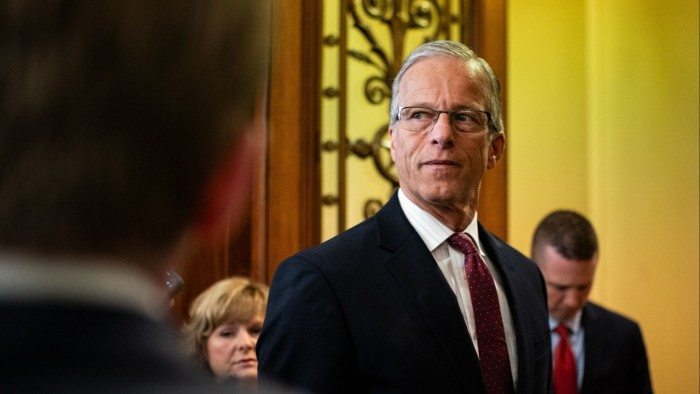Unlock the White House Watch newsletter for free
Your guide to what Trump’s second term means for Washington, business and the world
Policymakers in Washington are considering a multibillion-dollar tax break for private credit funds as part of President Donald Trump’s flagship spending plan, even as the bill would swell US debt and cut programmes such as indigent medical care.
The proposal would limit taxes on dividends paid to investors in so-called business development companies, one of the primary investment vehicles utilised by the private credit industry.
The terms were included in Trump’s “big, beautiful bill” that passed the US House of Representatives, Congress’ lower chamber, last month. It was left out of the Senate’s draft version, but could be added back in the coming days amid fierce lobbying over amendments to the final version, people familiar with the deliberations told the Financial Times.
Congress’s non-partisan Joint Committee on Taxation estimated the private credit tax break would cost $10.7bn through to 2034. The amendments were still in flux and the proposal could ultimately die in the Senate, the people cautioned.
“This is what armies of lobbyists and an infinite arsenal of political donations get you: massive tax breaks at the expense of healthcare, education and food assistance for American families,” Elizabeth Warren, the Democratic senator from Massachusetts, told the Financial Times. “Private credit companies don’t need a tax break — working people do.”
The debate over extending the tax breaks to BDCs comes as Republicans debate massive cuts to services for the poorest Americans. The House bill slashed Medicaid, the government health insurance programme for people on low incomes, and the Special Nutrition Assistance Program, which helps poorer families pay for food, by more than $1tn combined by 2034.
The bill is also expected to swell the country’s deficit, with the Congressional Budget Office warning it will add $2.4tn to the US debt by 2034. The CBO also said it would do little to stimulate growth.
Brandon DeBot, policy director at the Tax Law Center at NYU Law, said the proposal would “reduce resources for the lowest-income households overall, while providing large tax cuts for high-income taxpayers and, in the case of BDCs, investors in private investment funds”.
The finance industry’s biggest players, including Blackstone, Ares Management, Apollo Global and Blue Owl Capital, have in recent years launched private lending funds structured as BDCs to manage an avalanche of capital from wealthy individual investors.
The tax break would make a portion of the dividend income paid to investors in the funds tax-exempt, bolstering their appeal and aiding the firms’ ability to draw in even more clients, industry executives said.
Proponents of the change have argued it would align treatment of BDCs with a similar vehicle popular in real estate investment, known as Reits. Its proponents are labelling the provision “Reit parity”, though it is officially referred to as an “extension of deduction for qualified business income” in the legislation.
The real estate industry lobbied and won its tax breaks in 2017 as part of Trump’s Tax Cuts and Jobs Act, arguing the broader corporate tax cuts would disadvantage pass-through vehicles such as Reits.
The private credit industry has ballooned in the wake of the global financial crisis, when post-crisis regulation limited the ability of banks to underwrite riskier corporate loans. Private credit funds have filled the gap, becoming go-to lenders for a growing part of corporate America.
Retail investment vehicles such as BDCs have hoovered in new capital as investors have been drawn in by the high returns on offer. Investment bank Robert A Stanger & Co estimated fundraising for such investment vehicles reached nearly $44bn last year, up more than 70 per cent from the prior year.
Industry lobbyists have argued the tax breaks would draw even more capital in, allowing these funds to lend more money to mid-sized US companies, according to one person briefed on the discussions around the bill.
Republicans who crafted the legislation in the House were “persuaded” that the breaks would help “promote capital formation”, the person added.
A second person noted that while the Senate finance committee debated the measure, it was killed after some lobbyists sought to expand the tax breaks to other fund structures. As the price tag rose, the Senate dropped the provision, they added. But its proponents were seeking to reintroduce a simpler proposal that would attract less opposition, they said.
Additional reporting by Myles McCormick in Washington
Read the full article here




